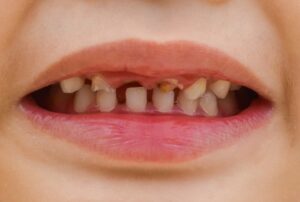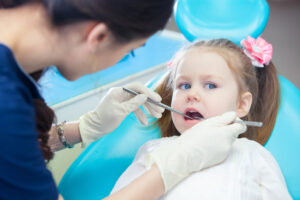Is Children’s Dental Care Important?
Children are not just miniature humans. Their bodies are constantly changing and growing, creating complications and considerations that don’t apply to adults. Every aspect of a child’s health is important, and that includes his or her dental health.
Obtaining the appropriate dental care for children, is an essential part of maintaining great oral health. Great oral health contributes to great overall health!
Why is Children’s Dental Care Important?
In order to explain the importance of great dental care for your children, we will debunk some common myths and misconceptions we hear from parents.
 Myth #1: We don’t need to worry about baby teeth because they’re just going to fall out.
Myth #1: We don’t need to worry about baby teeth because they’re just going to fall out.
Baby teeth do fall out. But they serve many important purposes before they do so. Baby teeth are essential in your child’s ability to learn to speak properly. When a child loses a tooth before it would naturally fall out on its own, it impacts his ability to make specific sounds.
Baby teeth are also necessary for the chewing process, which enables your child to absorb the nutrients necessary for healthy growth and development. Baby teeth also hold space in the jaws for the developing permanent teeth. The promote the appropriate growth of the jaw joints, and they support an open airway and good breathing.
Myth #2: Like other childhood issues, they’ll outgrow it.
Problems with the baby teeth can affect the underlying permanent teeth, leading to dental issues that can last a lifetime. If the jaws and airway do not develop properly, you child can suffer from long-term TMJ problems and sleep-disordered breathing for decades.
If your child has dental problems on their permanent teeth, those teeth will require restorations and constant maintenance of those restorations throughout his life.
Myth #3: Baby teeth are just like adult teeth.
 This may be the most important misconception for you to understand clearly. Baby teeth are not just like permanent teeth. The enamel covering baby teeth is much thinner than the layer of enamel covering permanent teeth. That means that when cavities start, they grow very quickly. A cavity on a baby tooth can go from zero to enormous seemingly overnight. We often see patients with large cavities whose parents are beating themselves up because they didn’t catch it sooner.
This may be the most important misconception for you to understand clearly. Baby teeth are not just like permanent teeth. The enamel covering baby teeth is much thinner than the layer of enamel covering permanent teeth. That means that when cavities start, they grow very quickly. A cavity on a baby tooth can go from zero to enormous seemingly overnight. We often see patients with large cavities whose parents are beating themselves up because they didn’t catch it sooner.
First, take it easy on yourself because these cavities do grow very quickly. Next, use this knowledge as motivation to check your child’s mouth more frequently so that something like this doesn’t sneak up on you. Call the dentist as soon as you see anything abnormal.
Myth #4: If something is bothering my kid, she’ll tell me.
This is another important misconception to correct. Children to not experience or respond to pain in the same way that adults do. A child can have a dangerous, severe dental infection and not tell you about it. Unless you are consistently evaluating the child’s mouth, you might not notice that something is off. Many times, your child simply does not feel pain with a very large cavity or dental abscess. Other times, your child doesn’t notice it until it’s an obvious swelling.
What Does Children’s Dental Care Involve?
Now that you understand how important children’s dental care is, you should know what it involves. Maintaining great dental care takes both home care and dental visits.
Home Care
Your kids are very smart. We know they are. But no matter how smart and mature they are, you cannot trust them to effectively and consistently clean their teeth. Kids need supervision of their oral hygiene regimen in order to fight dental diseases.
You can let your kid brush and floss on his own, but you should always perform a follow-up check afterward. Institute the use of plaque-disclosing tablets so that your child can see the plaque he is trying to remove. You can even make it a competition to see who can clean their teeth the best in the family.
By removing plaque with your home care, you reduce the risk of cavities and gum disease greatly!
Professional Care
Even with great home care, you need to make sure your children see a dentist on a consistent basis. As we said earlier, a lot of children’s dental health problems seem to pop up overnight. This won’t happen when the child has regular check-ups with the dentist. They allow us to catch these problems in their earliest stages, performing conservative treatments and giving you preventive options to help stop any further disease from developing.
Professional care should include twice yearly dental cleanings with a registered dental hygienist, yearly x-rays (which show those early cavities), and twice yearly evaluations by the dentist.
Whom Should We See for Children’s Dental Care?
We hear this question a lot. Should you take your child to a “regular” dentist, or does he need to see a pediatric dentist? The answer actually varies by the child. Some children do well in the more “adult” environment of a general dentist’s office. Others will be able to tolerate their needed dental care better in an office that is tailored to children.
A pediatric dentist receives several years of additional education and training necessary to specialize in the treatment of children. This training includes sedating children, treating those with complex dental issues, and treating those with behavioral problems.
At Designer Smiles, we love seeing patients of all ages. If we feel that your child will receive better care from a pediatric dentist, we will refer you to one whom we trust. Most kids “graduate” from a pediatric dentist in their late teens and return to our office for their dental care.
More Questions about Children’s Dental Care?
Call Designer Smiles to schedule a consultation with our dentists to discuss your child’s dental health. You can also ask our doctors or hygienists any questions about children’s dental care at your next visit. We love educating our patients so that the entire family has great dental health.
